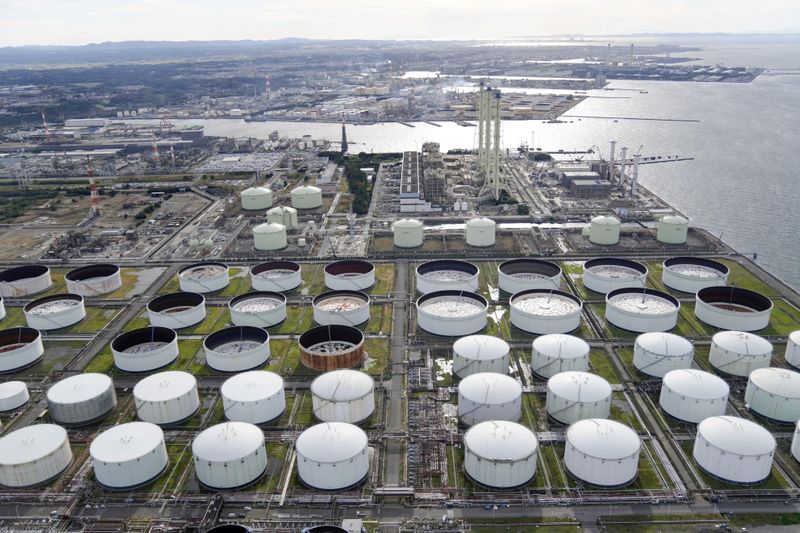By Scott DiSavino
NEW YORK (Reuters) - Oil prices rose to a one-week high on Tuesday after a move by the United States and other consumer nations to release tens of millions of barrels of oil from reserves to try to cool the market fell short of some expectations.
The United States said on Tuesday it would release millions of barrels of oil from strategic reserves in coordination with China, India, South Korea, Japan and Britain, to try to cool prices after OPEC+ producers repeatedly ignored calls for more crude.
But analysts said the effect on prices was likely to be short-lived after years of declining investment and a strong global recovery from the COVID-19 pandemic.
Brent futures rose $2.61, or 3.3%, to settle at $82.31, while U.S. West Texas Intermediate (WTI) crude rose $1.75, or 2.3%, to settle at $78.50.
That was the biggest daily percentage gain for Brent since August and its highest close since Nov. 16. It also pushed Brent's premium over WTI to its highest since mid-October.
Talk of a coordinated reserves release, a strong U.S. dollar and a potential hit to energy demand from a fourth wave of COVID-19 cases in Europe has already caused Brent prices to drop over 10% since hitting a three-year high of $86.70 on Oct. 25.
President Joe Biden's administration said it would release 50 million barrels from the U.S. Strategic Petroleum Reserve (SPR), which will start hitting the market in mid to late December.
"The coordinated SPR release was smaller-than-expected and undoubtedly will be met by less production from OPEC+," said Edward Moya, senior market analysts at OANDA, noting "No one would be surprised if (OPEC+) scaled down their production plans."
The OPEC+ alliance between the Organization of the Petroleum Exporting Countries and allies including Russia has so far rebuffed repeated requests from Washington to pump more oil.
The United Arab Emirates Energy Minister Suhail Al-Mazrouei said on Tuesday the UAE saw "no logic" in increasing its own contributions to global markets at the moment, adding technical data gathered ahead of an upcoming OPEC+ meeting in December pointed to an oil surplus in the first quarter of 2022.
Analysts said companies that buy oil from the U.S. SPR will have to return it in 2022-2024 when prices are much cheaper than now. Futures were trading around $75 in 2022, $69 in 2023 and $65 in 2024.
"We ... expect a flattening of the curve, as parts of the SPR release will need to be replenished again," said Bjornar Tonhaugen, head of oil markets at Rystad Energy.
The oil rally came ahead of U.S. inventory reports from the American Petroleum Institute (API), an industry group, on Tuesday and the U.S. Energy Information Administration on Wednesday.
Analysts expect the latest weekly U.S. oil inventory data to show a 0.5 million barrel draw from crude stocks.
The dollar index, meanwhile, held near a 16-month high on Tuesday after Federal Reserve Chair Jerome Powell was picked for a second term, reinforcing market expectations that U.S. interest rates will rise in 2022.
A stronger dollar makes oil more expensive for holders of other currencies, which traders said was weighing on crude prices.
